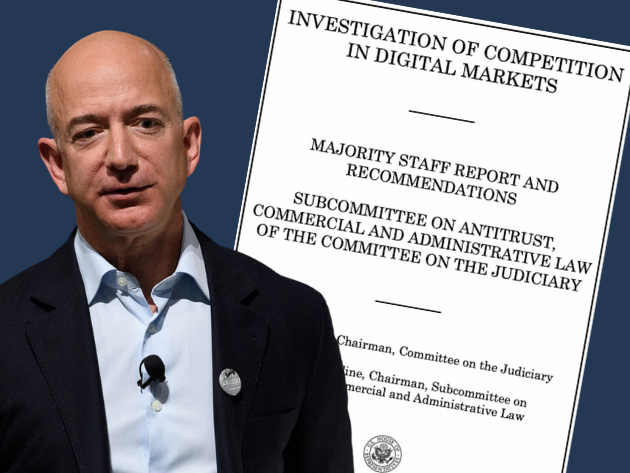
Federal lawmakers introduced a wave of legislation Friday that collectively seeks to change the way large tech companies such as Amazon, Apple, Google, and Facebook do business and dominate their respective marketplaces.
The five bills would create a framework to dismantle large tech companies into smaller ones (Amazon and Amazon Web Services, for example); to make mergers more expansive and difficult; to break up businesses that use their dominance in one area to get a stronghold in another; and to stop companies that create purportedly open marketplaces and only to game it to favor their own products.
The sweeping package from House Democrats and Republicans comes after months of study and congressional inquiries about the enormous power and financial reach of Big Tech and the existing regulation to curtail it. As the New York Times noted, “Amazon, Apple, Facebook, and Google have a combined market capitalization of $6.3 trillion, four times more than the value of the country’s 10 largest banks.”
One bill regarding data portability — perhaps the least contentious of the group — would require companies to allow users to switch platforms more easily by allowing data to migrate from one platform to another. All of the measures have varying amounts of bipartisan support.
Margaret O’Mara, a University of Washington history professor who has written extensively about the history of the tech industry, said regulation of these companies is one of the few areas of mutual political interest.
“At a time when Washington D.C is so divided — the Republicans and the Democrats are so far apart — the power of the tech companies is one of the things where both parties find common ground,” she said.
That common interest, she said, isn’t always bad for the tech industry.
The Senate recently approved the bipartisan Endless Frontier Act which, if passed by the House, would put nearly $250 billion into promoting specific emerging technologies in the U.S. that China seeks to dominate, including quantum computing, artificial intelligence, and robotics among other things.
Friday’s legislative package is based on the House’s antitrust hearings over the past 16 months. If approved by Congress and signed by the president, the bills would be the most significant overhaul of competition laws dating back to what was known as the “gilded age” of railroad, oil, and steel magnates and their monopolies in the early 20th Century.
O’Mara said the country has traded the gilded age for the tech age. And like the former, people should expect some change in the most powerful companies. The bipartisan nature of the tech regulation package, she said, means that “something will come out of this. We just don’t know what yet.”
from GeekWire https://www.geekwire.com/2021/federal-antitrust-legislation-puts-amazon-big-tech-notice-target/